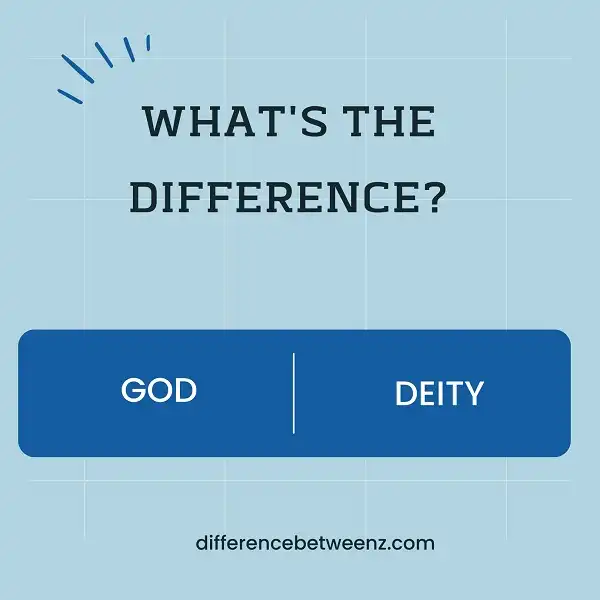God Vs. Deity
Difference between God and Deity: – Many scholars and intellectuals have tried to define god and deities, but it has been very difficult to define them.
The gods and deities are beings who possess divine powers and are therefore worshiped throughout the world in various forms.
The idea that there is a supreme power that controls and manages the universe is accepted by most people.
The term to define this supreme power differs from one culture to another or even differs in regions with the same culture.
God and deity are two words that are related to the beings that possess such supreme powers. However, again the use of these terms may differ from region to region.
It is very difficult to cover all aspects of these terms, but it allows considering the basic ideology behind these concepts.
Difference between God and Deity
If you still do not know what is the difference is between god and deity or you are simply looking for a little more information that complements what you already know, then continue reading, because below we explain everything you need to know about this interesting topic.
God
The word “god” can be used to refer to what some regard as the only supreme power.
Many people believe in a god, but a god can be worshiped in one religion and not another. Thus, there can be numerous forms of the same god.
In Hinduism, people believe that Brahma is the almighty god, and other deities like Rama, Ganesha, are all other forms of the same god, Brahma.
In some religions, God is also called the superhuman being who has the power to control the elements of nature and human fortunes.
God’s characteristics may differ, but the underlying beliefs for God remain the same on any part of the earth.
For example, all followers of God think that he created the universe and observes all the activities that occur in it.
The different types of gods
- Triple Goddesses.
- Psychopomps.
- Primordial Gods.
- Celestial Gods.
- The Culture Heroes.
- Death Gods.
- Cyclical & Liminal deities.
- Daimons
Names of God in Judaism
The name Jah forms part of the Tetragrammaton
- El,
- Elohim,
- Eloah,
- Elohai,
- El Shaddai,
- Tzevaot
12 Greek God names
- Zeus,
- Hera,
- Poseidon,
- Demeter,
- Athena,
- Apollo,
- Artemis,
- Ares,
- Hephaestus,
- Aphrodite,
- Hermes,
- Hestia or Dionysus
Deity
On the other hand, the term deity is usually used in the context of polytheistic religions in which the existence of more than one god is considered, so each god within that type of religion is considered as a deity rather than a single and Supreme Being. The deity can be used to describe a form of god.
For example, in India, the Hindu community believes in many gods, for that reason, it is common among them to speak of deities, not of a god.
To conclude, we can say that both concepts can be used as synonyms and there is no difference between them, both are used to refer to a supreme and divine power. However, the definition of god and deity may differ in many contexts.
3 Gods in Hindu Mythology
Brahma, Vishnu, and Shiva.
5 Supreme Deity in Hindu Culture
| Diety Name | Followers Name |
| Vishnu | Vaishnavism |
| Shiva | Shaivism |
| Shakti (Devi) | Shaktism |
| Ganesha | Ganapatism |
| Surya (Sun) | Saurism |
What’s the Difference Between Polytheism and Monotheism?
Theism
Theism refers to the belief in divine power or deity.
Polytheism
Polytheism is the belief in more than one god
Monotheism
Monotheism belief that a single god is the creator of everything.


